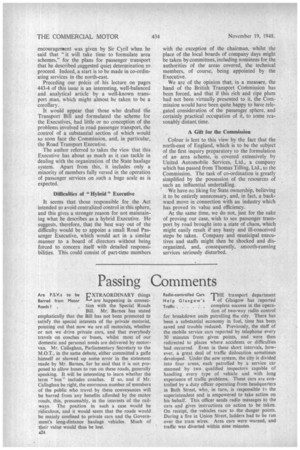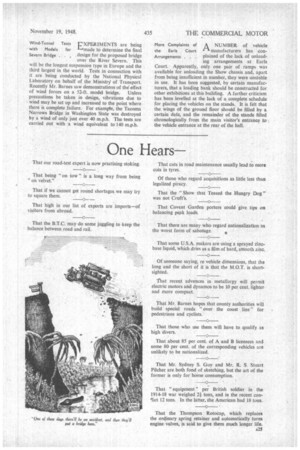Passing Comments
Page 26

Page 27

If you've noticed an error in this article please click here to report it so we can fix it.
Are P.S.V.s to be r XTRAORDINARY things Barred from Motor " are happening in connec Roads . tion with the Special Roads
Bill. Mr. Barnes has stated emphatically that the Bill has not been promoted to satisfy the special interests of the private motorist, pointing out that now we are all motorists, whether or not we drive private cars, and that everybody travels on coaches or buses, whilst most of our domestic and personal needs are delivered by motorvan. Mr. Callaghan, Parliamentary Secretary to the M.O.T,, in the same debate, either committed a gaffe himself or showed up some error in the statement made by Mr. Barnes, for he said that it is not proposed to allow buses to run on these roads, generally speaking. It will be interesting to learn whether the term "bus" includes coaches. If so, and if Mr. Callaghan be right, the enormous number of members of the public who travel by these conveyances will be barred from any benefits afforded by the motor roads, this, presumably, in the interests of the railways. The position in such a case would be ridiculous, and it would seem that the roads would be mainly confined to private cars and the Government's long-distance haulage vehicles. Much of their value would thus be lost.
A24
THE transport department of Glasgow has reported complete success in the operation of two-way radio control for breakdown units patrolling the city. There has been a substantial economy in fuel, time has been saved and trouble reduced. Previously, the staff of the mobile service cars reported by telephone every 30 minutes from given points, and were then redirected to places where accidents or difficulties had occurred. Even in these short intervals, however, a great deal of traffic dislocation sometimes developed. Under the new system, the city is divided into four areas, each patrolled by a service car manned by two qualified inspectors capable of handling every type of vehicle and with long experience of traffic problems. These cars are controlled by a duty officer operating from headquarters in Bath Street, who, in turn, is responsible to the superintendent and is empowered to take action on his behalf. This officer sends radio messages to the cars and gives instructions on action to be taken. On receipt, the vehicles race to the danger points. During a fire in Union Street, ladders had to be run over the tram wires. Area cars were warned, and traffic was diverted within nine minutes
Radlo.controlled Cars Help Glasgow's Traffic
Wind-Tunnel Tests rXPERIMENTS are being with Models for "made to determine the final
Severn Bridge . design for the proposed bridge over the River Severn. This will be the longest suspension type in Europe and the third largest in the world. Tests in connection with it are being conducted by the National Physical Laboratory on behalf of the Ministry of Transport. Recently Mr. Barnes saw demonstrations of the' effect of wind forces on a 52-ft. model bridge. Unless precautions be taken in design, vibrations due to wind may be set up and increased to the point where there is complete failure. For exarnpte, the Tacoma Narrows Bridge in Washington State was destroyed by a wind of only just over 40 m.p.h. The tests are carried out with a wind equivalent to 140 m.p.h.
More Complaints of A NUMBER of vehicle the Earls Court "manufacturers has conArrangements .
plained of the lack of unload . .
ing arrangements at Earls Court. Apparently, only one pair of ramps was available for unloading the Show chassis and, apart from being insufficient in number, they were unstable in use. It has been suggested, by certain manufacturers, that a loading bank should be constructed for other exhibitions at this building. A further criticism has been levelled at the lack of a complete schedule for placing the vehicles on the stands, It is felt that the wings of the ground floor should be filled by a certain date, and the remainder of the stands filled chronologically from the main visitor's entrance to the vehicle entrance at the rear of the hall.




























































































